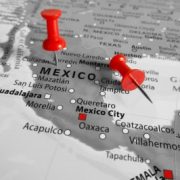Mexico, Canada play hardball on trade deal over steel tariffs
Washington Examiner / Sean Higgins / October 26
Juan Carlos Baker, Mexico’s deputy commerce minister, said Friday that his government may not sign the final text of the United States-Mexico-Canada Agreement on trade if the U.S. does not agree to provide exemptions to its tariffs on steel and aluminum.
The Trump administration is balking at that demand, however, as its counter-proposal, a quota system, is getting the cold shoulder from both Mexico and Canada, which is also seeking an exemption from the tariffs.
“We believe we need to solve that issue before the signing takes place,” Baker told reporters in Ottawa. The signing has been tentatively set for the end of November.
It was the toughest threat yet from one of the negotiators over the deal that would replace the North American Free Trade Agreement. Mexico and Canada have lobbied the U.S. to lift exemptions to the tariffs, 25 percent for steel and 10 percent for aluminum, arguing that now that the talks for the USMCA deal are complete, there’s no need to maintain those tariffs.
The U.S. however has resisted providing the exemptions, fearing that doing so would allow China, the main target of the tariffs, to harm the U.S. steel industry.
“The president is reviewing the steel and aluminum tariffs,” said Kelly Craft, U.S. ambassador to Canada, Friday at a forum hosted by the Ontario Chamber of Commerce. “That is not something that is against Canada … It’s just protecting North America from other countries that will be passing raw materials through, and also to protect our steel industry at home.”
The White House initially carved out exceptions for Canada and Mexico to its steel and aluminum tariffs , then revoked them in June as a way to pressure both countries during the talks to replace the North American Free Trade Agreement.
The U.S. has proposed replacing the tariffs with a quota system, similar to what it did for South Korea regarding steel, when in August it allowed a quota of 70 percent of average steel exports to the United States in the years 2015 to 2017. Neither Canada nor Mexico are expressing interest on that, according to an administration official who requested anonymity to discuss ongoing talks. As a consequence, there isn’t much talk going on between the countries to resolve the tariff issue, the official said.
A Canadian government official, speaking anonymously, told the CBC earlier this week, that a quota proposal was a concession that Canada would make. Officials see no reason why they cannot return to status quo on metal imports from before the NAFTA talks. “There is no need for those tariffs to be in place,” Canadian Ambassador David MacNaughton said Friday in Ottawa.
Backers of the administration’s policies say a quota is still the best compromise for all sides. “From a U.S. industry perspective, tariffs are similarly effective to quotas if done right,” said Michael Stumo, chief executive officer of the business-labor Coalition for a Prosperous America. “From Canada’s perspective, they should want quotas rather than tariffs because with a quota, their industry gets the money, but with a tariff, the U.S. government gets the money.”
Critics charge that the systems lead to cronyism. “They empower foreign governments to pick winners and losers by deciding which steel or aluminum companies are allocated part of each country’s quota to export to the United States,” said Bryan Riley, trade policy analyst for the National Taxpayers Union. “That’s one reason quotas may be harder to get rid of than tariffs — they can create a political constituency in foreign countries in support of the quotas.”
Hugo Perezcano Diaz, deputy director of the international law research program at Canada’s Centre for International Governance Innovation and a former NAFTA negotiator, speculates that the quota talk may be leading to an alternate solution, a closed three-country market. “Canada has already adopted a safeguard against imports of steel products from the rest of the world, including Mexico,” he said. “If Mexico were to do something similar and the three countries close the North American market, the U.S. may feel sufficiently protected to eliminate the tariffs.”
Washington Examiner / Sean Higgins / October 26








